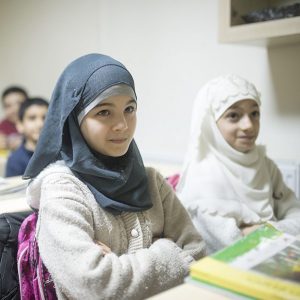Recently Completed: Research to improve the quality of teaching and learning inside Syria
We are pleased to announce the completion of a ten-month education research study for the UK Department for International Development (DFID). The study sought to provide an academically rigorous evidence base to help improve the quality of teaching and learning inside Syria, as well as in other fragile and conflict-affected contexts. Integrity provided an in-depth review of the learning environment for Grade 2 and Grade 3 children in areas of Syria not controlled by the Government of Syria.

The research study examined teacher practice and behaviour, the nature of the learning environment, and their effects on child learning and wellbeing. It was aimed at donors, policy makers, researchers and implementers working on education in crises and conflicts, particularly those with an interest in Syria.
The study sought to provide informed and policy relevant insights on suggested investments in child learning, namely by improving the nature of their learning environments, and in particular, the quality of teaching.
“The purpose of the research is to better understand the teaching and learning environment in schools and non-formal learning spaces inside Syria and to identify examples of best practice to address some of the barriers to safe, quality, inclusive education. This research will improve our understanding of how schools can promote children’s learning and wellbeing in conflict contexts.”
– Quote from the DFID terms of reference
An Evidence Base for Better Education Programming in Crises and Conflicts
The study represented the first wide-scale analysis since the start of the Syrian conflict of how teacher practice and learning spaces influence child learning and wellbeing. The success of the study came from finding a balance between rigour in its framing and flexibility in its delivery. By creating theoretical and methodological frameworks for the design of the study, influenced both by critical literature and real time context analysis, the study team was able to balance strict parameters for ethical data collection practices with the changing operating environment.
The voices that influenced the study’s findings were thus representative of education sector actors, meaning that the preponderance of data came from teachers, children, parents and caregivers. The result was an ethically sound and deeply granular dataset.
Acknowledgment
The Integrity team acknowledges and expresses deep appreciation and respect for the thousands of Syrian children, teachers, parents/caregivers, school administrators, Local Council members, (International) Non-governmental Organisation ((I)NGO) staff members, and education authority representatives who opened the doors to their schools, classrooms, and homes for this study.
Acknowledgment and thanks also go out to the enumerators who tirelessly collected hundreds of thousands of data points, and who were the true eyes and ears of the project on the ground in contexts of ongoing instability.
The team also thanks the hundreds of unnamed respondents outside of Syria who helped frame this study with careful consideration for the implications of shifting geopolitical interests, and without losing sight of both humanitarian principles and the standards to which we hold ourselves in crises and conflicts.
Finally, Integrity is most grateful to DFID, the funder of this study, for its thoughtful foresight to allocate resources to such a comparatively in-depth and unique look at a critically under-researched thematic.
Methodology
Too often, studies in fragile and conflict-affected contexts rely on secondary data and presume that because primary data collection is difficult, it needs to be overly simplified or avoided all together. As a result, studies from these contexts often lack evidence or represent a biased perspective. However, resources and methods exist that can enable evidence-based policy development, even in active conflicts. For this study, Integrity sought to demonstrate best-practice feasibility by balancing limited resources and ethical expectations to secure data from the most reliable sources: the end users of assistance funds.
A small but expert team of Syria, conflict and education specialists undertook research in four phases:
Inception: The team established a thorough understanding of possible stakeholder interests. The mapping involved outreach to approximately 350 respondents with global, regional or Syria-specific perspectives on the research topic, including policymakers, academics, and implementors. The team also conducted a literature review of more than 150 relevant pieces of literature in Arabic and English, from Syria-specific project reports to assessments from other fragile and conflict-affected contexts on EiCC best practice.
Design: The team fleshed out the methodology for primary data collection, informed by security analysis and projections, desk research, and stakeholder guidance. Ethical considerations, seen through a context-specific lens, were given the highest priority. The team developed a data collection toolkit of 32 tools related to the study topics, comprising 339 questions for a wide range of education-sector respondents.
Primary data collection: Using this methodological framework, 12 enumerators carried out eight weeks of data collection, resulting in nearly 6,000 records sourced across Idleb, Aleppo, and Ar-Raqqa governorates, from approximately 300 schools. The sample achieved a gender balance (50% of respondents were female and 50% were male). It also included 30% internally displaced people (and 70% local respondents). Feasible and ethical research conditions were established through clear red lines for respondents and the ability to stop the questioning, as well as ethics and behaviour training for enumerators and facilitating agents. The use of hawala networks, offline data collection tools, low bandwidth communication protocols, and trusted networks provided efficient means for the secure movement of people, data collection, and data aggregation.
Data analysis and report writing: Relying on the concurrent triangulation that took place during the third phase, the study team undertook an in-depth analysis of the quantitative and qualitative data against the theoretical framework established at the outset of the study.
Read our briefing note on the project below:
integrity-briefing-note-education-lessons-from-syria